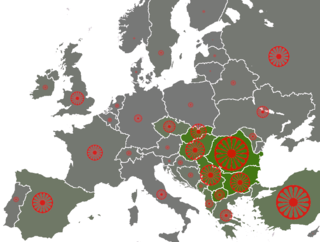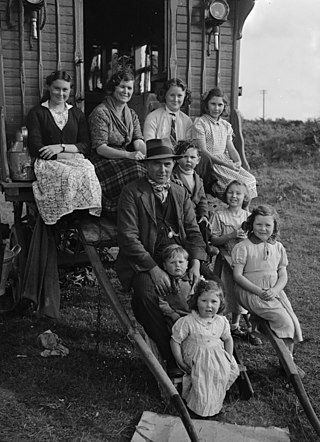Related Research Articles

The Romani people, also known as the Roma or Romani, are an Indo-Aryan ethnic group who traditionally lived a nomadic, itinerant lifestyle. Linguistic and genetic evidence suggests that the Romani people originated in the Indian subcontinent, in particular the region of Rajasthan. Their first wave of westward migration is believed to have occurred sometime between the 5th and 11th centuries. They are thought to have first arrived in Europe sometime between the 9th and 14th centuries. Although they are widely dispersed, their most concentrated populations are believed to be in Bulgaria, Hungary, Romania, Serbia and Slovakia.

The Romani Holocaust was the genocide of European Roma and Sinti people during World War II. Beginning in 1933, Nazi Germany systematically persecuted the European Roma, Sinti and other peoples pejoratively labeled 'Gypsy' through forcible internment and compulsory sterilization. German authorities summarily and arbitrarily subjected Romani people to incarceration, forced labor, deportation and mass murder in concentration and extermination camps.

The Imperial Council was the legislature of the Austrian Empire from 1861 until 1918. It was a bicameral body: the upper house was the House of Lords, and the lower house was the House of Deputies. To become law, bills had to be passed by both houses, signed by the government minister responsible, and then granted royal assent by the Emperor. After having been passed, laws were published in the Reichsgesetzblatt. In addition to the Imperial Council, the fifteen individual crown lands of Cisleithania had their own diets.

The Yenish are an itinerant group in Western Europe who live mostly in Germany, Austria, Switzerland, Luxembourg, Belgium, and parts of France, roughly centered on the Rhineland. A number of theories for the group's origins have been proposed, notingly that the Yenish descended from members of the marginalized and vagrant poor classes of society of the early modern period,including persecuted Ashkenazi jews and gypsies, before emerging as a distinct group by the early 19th century. Most of the Yenish became sedentary in the course of the mid-19th to 20th centuries.

The Nuremberg Laws were antisemitic and racist laws that were enacted in Nazi Germany on 15 September 1935, at a special meeting of the Reichstag convened during the annual Nuremberg Rally of the Nazi Party. The two laws were the Law for the Protection of German Blood and German Honour, which forbade marriages and extramarital intercourse between Jews and Germans and the employment of German females under 45 in Jewish households; and the Reich Citizenship Law, which declared that only those of German or related blood were eligible to be Reich citizens. The remainder were classed as state subjects without any citizenship rights. A supplementary decree outlining the definition of who was Jewish was passed on 14 November, and the Reich Citizenship Law officially came into force on that date. The laws were expanded on 26 November 1935 to include Romani and Black people. This supplementary decree defined Romani people as "enemies of the race-based state", the same category as Jews.

Lety concentration camp was a World War II internment camp for Romani people from Bohemia and Moravia during the German occupation of Czechoslovakia. It was located in Lety.

Romani people in Romania, locally and pejoratively referred to as the Țigani, constitute the second largest ethnic minority in the country. According to the 2021 census, their number was 569,477 people and 3.4% of the total population. The size of the total population of people with Romani ancestry in Romania is even more, with different estimates varying from 4.6 percent to over 10 percent of the population, because many people of Romani descent do not declare themselves Roma. For example, in 2007 the Council of Europe estimated that approximately 1.85 million Roma lived in Romania, based on an average between the lowest estimate and the highest estimate available at the time. This figure is equivalent to 8.32% of the population. On the other hand, less than half are native speakers of the Romani language.

Romani culture encompasses the regional cultures of the Romani people, an Indo-Aryan ethnic group originating in northwest India. These cultures have developed through complex histories of interaction with their surrounding populations.

The Romani flag or the flag of the Roma is the international ethnic flag of the Romani people, historically known as "Gypsies", which form a stateless minority in countries across Eurasia, Africa, the Americas, and Australasia. It was approved by the representatives of various Romani communities at the first and second World Romani Congresses (WRC), in 1971 and 1978. The flag consists of a background of blue and green, representing the heavens and earth, respectively; it also contains a 16-spoke red dharmachakra, or cartwheel, in the center. The latter element stands for the itinerant tradition of the Romani people and is also an homage to the flag of India, added to the flag by scholar Weer Rajendra Rishi. It superseded a number of tribal emblems and banners, several of which evoked claims of Romani descent from the Ancient Egyptians.

Romani people in Bulgaria constitute Europe's densest Roma minority. The Romani people in Bulgaria may speak Bulgarian, Turkish or Romani, depending on the region.

Anti-Romani sentiment is an ideology which consists of hostility, prejudice, discrimination, racism and xenophobia which is specifically directed at Romani people. Non-Romani itinerant groups in Europe such as the Yenish, Irish and Highland Travellers are frequently given the name "gypsy" and as a result, they are frequently confused with the Romani people. As a result, sentiments which were originally directed at the Romani people are also directed at other traveler groups and they are frequently referred to as "antigypsy" sentiments.

The Romani diaspora refers to the presence and dispersion of Romani people across various parts of the world. Their migration out of the Indian subcontinent occurred in waves, with the first estimated to have taken place in the 6th century. They are believed to have first arrived in Europe sometime between the 9th and 14th centuries, via the Balkans. They settled in the areas of present-day Turkey, Greece, Serbia, Romania, Croatia, Moldova, Bulgaria, North Macedonia, Hungary, Albania, Kosovo, Montenegro, Bosnia and Herzegovina, Czech Republic, Slovenia and Slovakia, by order of volume, and Spain. From the Balkans, they migrated throughout Europe and, in the 19th and later centuries, to the Americas. The Roma population in the United States is estimated at more than one million.
Scottish Romani are the Romani people of Scotland. This includes Romanichal and Lowland Romani.

The Kale are a Romani subgroup predominantly found in northwestern Wales, specifically in the Welsh-speaking areas. Romani have been present in Wales since the 16th century.
Romani people in France, generally known in spoken French as gitans, tsiganes or manouches, are an ethnic group that originated in Northern India. The exact number of Romani people in France is unknown; estimates vary from 500,000 to 1,200,000.
The Romani people are known by a variety of names, mostly as Gypsies, Roma, Romani, Tsinganoi, Bohémiens, and various linguistic variations of these names. There are also numerous subgroups and clans with their own self-designations, such as the Sinti, Kalderash, Boyash, Manouche, Lovari, Lăutari, Machvaya, Romanichal, Romanisael, Calé, Kale, Kaale, Xoraxai, Xaladytka, Romungro, Ursari and Sevlengere.
The deportation of Roma migrants from France was subject of intense political debate in France and internationally in 2009 and 2010. After two fatal incidents, President of France Nicolas Sarkozy vowed in July 2010 to evict at least half of the 539 Roma squatting in land camps. The Government of France initiated a program to repatriate thousands of Romanian and Bulgarian Roma, as part of the crackdown. Between July and September 2010, at least 51 Roma camps were demolished, and France has repatriated at least 1,230 Roma to Romania and Bulgaria.

Romani Americans are Americans who have full or partial Romani ancestry. It is estimated that there are one million Romani people in the United States. Though the Romani population in the United States has largely assimilated into American society, the largest concentrations are in Southern California, the Pacific Northwest, Southwestern United States, Texas, Louisiana, Florida and the Northeast as well as in cities such as Chicago, Cleveland, and St. Louis.

The Romani people in Australia are citizens of Australia who are of Romani descent. They are sometimes referred to as Roma. Most Roma in Australia trace their roots to the United Kingdom and Greece, who in return trace their roots to northern India.
Gypsy, Roma and Traveller is an umbrella term used in the United Kingdom to represent several diverse ethnic groups which have a shared history of nomadism.
References
- Hamman, Brigitte (1999). Hitler's Vienna: A Dictator's Apprenticeship. New York: Oxford University Press. ISBN 0-19-512537-1.
- Mommsen, Hans (2003). The Third Reich Between Vision and Reality: New Perspectives on German History 1918-1945. Berg Publishers. ISBN 1-85973-627-0.